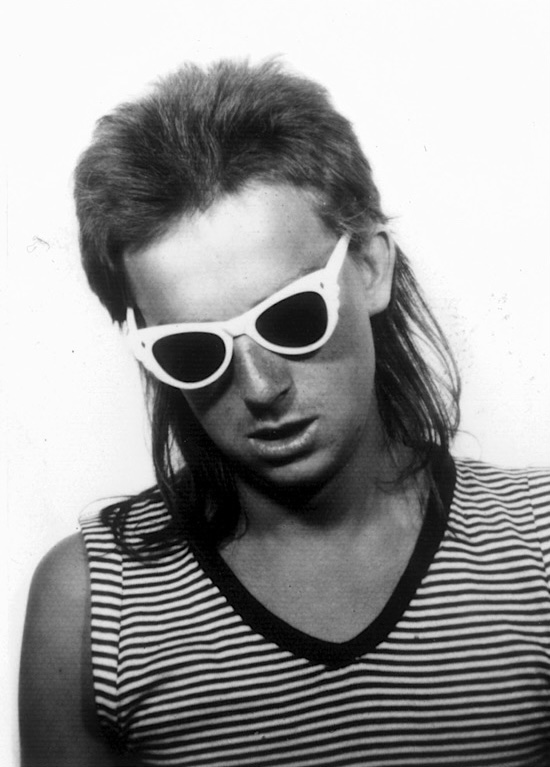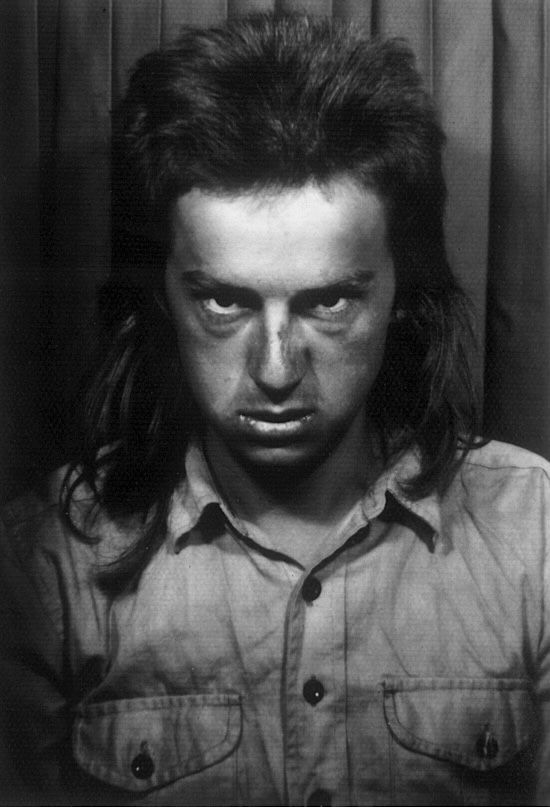With Cabaret Voltaire and working alone, Richard H. Kirk, who has left us far too soon at the age of 65, inscribed the future in which we’re presently living. Not just the post-rock landscape of atmospherics, processed beats, modified sound, samples, loops and electronics but also the future of which they forewarned in their paranoiac-critical shrewdness; of far right American demagoguery, digital surveillance, a virus, an overheated media environment and the sense that the supposed sensible, authoritarian voices of reason have, in reality, brought us to the edge of collapse. “There was definitely an anti-establishment vibe to Cabaret Voltaire,” Kirk once told me. “The idea of control, of the machine of surveillance – taking the piss out of the bourgeois. We were still hung up on the counterculture of the 60s, which we factored into the music. It was instinctual, inevitable and we were cool with that.”
Cabaret Voltaire emerged from Sheffield, forming in 1972 when its members – Kirk, Stephen Mallinder and Chris Watson were still in their teens. But they were not, as is sometimes made out, sonically determined and shaped by the city’s industrial environment, absorbing the rhythms of the steel mills. “I think there’s a myth about Sheffield that we were trying to replicate the sound of factories. I lived in the East End of Sheffield and from where I was you could see right down into the valley which was full of all these big fucking black buildings churning out Christ knows what. You could hear the stuff going on at night – but there was never any notion in Cabaret Voltaire of trying to make the noise of the factory. Why would you want to do that? You want to move away from that, escape into some alternative reality. It was grim, Sheffield, but it was the boredom it created that prompted us to start the band. There were very few clubs, very little music apart from Tony Christie or whatever, so we decided to invent some.”
Cabaret Voltaire were born in a cultural darkness, illuminated only by a few tiny slivers of futurism – Eno with Roxy Music on Top Of The Pops, the Delia Derbyshire-arranged Dr Who theme, Quatermass. They were indeed inspired by ways of being elsewhen and elsewhere – the Dada movement, born in Zurich in 1916 from whose crucible the group took their name, whose deconstruction of conventional forms, use of collage and embrace of chance as a creative factor (ditto William Burroughs and his “cut up” methods) mirrored a war-torn society far more violent and outrageous than anything they could muster in their theatrical happenings. They dreamed European dreams, embraced Krautrock, the conceptual antidote to prog, in which electronics figured heavily as musical collectives in Berlin, Düsseldorf, Hamburg, Cologne devised new forms, West German in origin, to rebuild a sense of cultural identity without debt to Anglo-American blues-based rock. But they dreamt American dreams also, pumped by the transatlantic funk and disco of James Brown, George Clinton, and Hamilton Bohannon.
With barely any equipment but determined to eschew the dreary drums/bass/guitar format and figurative norms such as verse, bridge and chorus. Cabaret Voltaire gradually took form. The results were legendarily chaotic. A gig they landed at a school in Bury, for which they arrived blind drunk, was terminated after four minutes. At a disco organised by a Sheffield group called Science For The People, they entertained dancers with a tapeloop of a steamhammer, while Kirk played clarinet with a rubberised jacket decked in fairylights. A riot ensued. Even the arrival of punk was not the immediate boon the group might have expected, as Mallinder found to his cost when they supported the Buzzcocks, suffering head injuries when the more lumpen element of the crowd took umbrage at their abreactions and showered them with bottles.
Only with post punk did Cabaret Voltaire develop the instrumental wherewithal to attain a record deal, with Rough Trade in 1978, setting up their own studio complex, Western Works, in Sheffield; as with Kraftwerk’s Klingklang, Faust’s Wümme Studios or Can’s recording space at Schloss Nörvenich, establishing such a space set them outsides the norms and imperatives of a regular commercial studio, enabled them to create unfettered. The works they produced as a trio were immense; Mallinder’s vocals were like garbled warnings transmitted from the near future, while Watson’s use of tapes and electronics jumbled the cathode and radio transmissions of the mediascape in a latterday emulation of Dadaist collage.
It was Kirk who provided the seared flesh of the Cabaret Voltaire sound across a range of instruments – guitar, saxophone, clarinet, electronics, all heavily treated – scathing, caustic, adrenaline waves of sound, the emanations of the group’s nervous system. The albums and singles they made as a trio including The Voice Of America, ‘Nag, Nag, Nag’, ‘Sluggin’ Fer Jesus’, ‘Three Mantras’ sound, if anything, more astonishing and audacious with age.
Funk was an increasing component in Cabaret Voltaire, following the departure of Chris Watson in 1981. As with groups like A Certain Ratio, The Pop Group, and 23 Skidoo, the allure of their approach was that they didn’t try to simulate, indeed weren’t capable of simulating, said Kirk, the likes of Funkadelic. Their efforts at funk were warped, morbid, strange, lending them a unique quality of their own. Throughout the 1980s, however, as technology improved, they did become more efficient at making a dance music of sorts, eventually decamping to Chicago, having signed to EMI, to create a house variation of their own. It was at this point that Kirk felt the group were in danger of succumbing to a commercialisation at odds with their prime directive. The breaking point for him came in America when a studio engineer compared Mallinder’s vocals, enthusiastically if somewhat bizarrely, to those of Phil Collins. He wanted out.

What followed for Kirk were over 30 years of giddyingly prolific studio output, which began with his involvement in the re-ignition of the UK dance scene, recording foundational works in the minimal bleep & bass scene, present at the birth of Warp records and its own, off-kilter variations on house music. The countless pseudonyms he used reflected the wilful diversity of his output, his refusal to fasten to any trend or settle in any groove – Al Jabr, Bit Crackle, Chemical Agent, Dark Magus, Nine Mile Dub, Pat Riot, Sandoz. He made his own imprint on an array of genres – funk, disco, industrial, arpeggiated ambient, tropicalia, techno, house, Krautrock, musique concrète, field recordings.
Kirk had been as interested in the visual arts as the musical in his formative years, and, he said, opted a “painterly” approach in the studio, influenced by surrealists such as Salvador Dali and Isidore Ducasse as much as Dada. This lent a strong and ever-present conceptual sense to his work, an understanding of avant garde principles which were established in the visual arts circa 1906 and are well understood, but when applied to music even now trigger vapours in those of squeamishly hidebound tastes. His modernism did not extend to all new technologies, however. He was wary of social media and did not participate in it, considering it a poor substitute for a life. He eschewed laptops, afraid they might crash, preferring the sturdy reliability of more vintage equipment.
Despite being practically housebound in Sheffield from the beginning of the pandemic, Shadow Of Fear, Kirk’s final album under the moniker of Cabaret Voltaire (to which he lay claim as the final member of the group) was a brilliant last testament to an artists whose energies were intact, whose inspiration was undimmed. It might for uncomfortably apt listening during the pandemic, and its appalling handling by the government with its catastrophic failings and mixed messages. Tracks like ‘Be Free’ and its juddering funk noir, for example and the electro-Gothic arches of ‘The Power Of Their Knowledge’. But its prophecies were not all bleak, as on the banging, quite joyous ‘Universal Energy’.
“There’s got to be light and shade,” he told me when I interviewed him for Electronic Sound in 2020. “There’s got to be something uplifting, rather everything being doom laden. I see it now as imagining a vaccine and everyone back on the dancefloor…”
The word “icon” is overused and I’m certainly not going to use it in relation to Richard H Kirk. He was capable of throwing some arresting, disconcerting shapes, peering menacingly from beneath his floppy fringe. However, as with Mallinder, he did not, in person, affect the sort of obnoxious hauteur which is considered by some necessary to maintain an air of cool. That was for too rock & roll, and Kirk was very much post-rock & roll. Although those who worked with him remarked that he was capable of bouts of grumpiness, as well as stubbornness, he was ultimately a lovely man with a homely, engaging manner in interviews which, while down to earth, never sought to puncture or deprecate the seriousness of his work. As Stephen Mallinder put it in an emotional tweet, “My Cabs music partner, and often sparring partner, difficult to live with but impossible not to love. Stubborn, no sufferer of fools, but insightful, spontaneous, and with vision .. and underneath the spiky shell a warm heart.”


